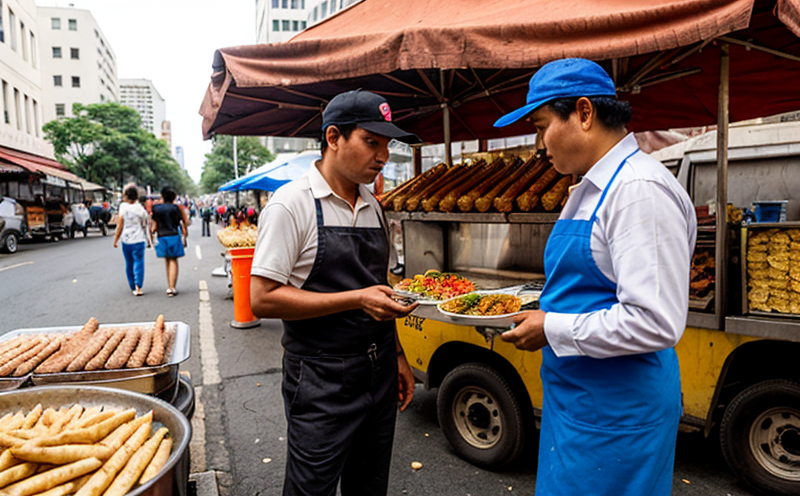Street food vendor inspection
The inspection of street food vendors is a critical process aimed at ensuring public health and safety. Street food plays an integral role in many urban landscapes, offering quick, convenient meals to consumers while providing economic opportunities for vendors. However, due to the nature of mobile operations and potential variability in hygiene practices, regular inspections are essential to mitigate risks associated with foodborne illnesses.
Our laboratory provides comprehensive inspection services that cover all aspects necessary to ensure a high standard of hygiene and safety for street food vendors. This includes evaluating the cleanliness of premises, assessing the quality of ingredients used, monitoring temperature controls during preparation and storage, and ensuring proper waste management practices are in place.
The primary goal is not only compliance with regulatory standards but also enhancing the overall quality and reputation of street food offerings. By conducting thorough inspections, we help vendors identify potential areas for improvement, thereby fostering a safer eating environment.
Our team of experts uses advanced testing methods to assess various parameters that influence the safety and hygiene of street foods. These tests are aligned with international standards such as ISO 22000:2018 and HACCP principles, ensuring our assessments meet rigorous quality benchmarks.
The importance of this service cannot be overstated, especially given the increasing popularity of street food across various demographics. With more people seeking diverse dining experiences, maintaining a high level of hygiene has become crucial for both consumer satisfaction and business success. Our inspections ensure that every aspect contributing to safe street foods is meticulously checked.
Moreover, by adhering strictly to international guidelines, we contribute significantly towards fostering trust between vendors and consumers, ultimately promoting healthier eating habits within communities.
Scope and Methodology
| Parameter | Description |
|---|---|
| Cleanliness of Premises | Evaluation includes floors, walls, windows, tables, and other surfaces. Tests for dirt, dust, and other contaminants. |
| Ingredient Quality | Assessment involves checking freshness, shelf life, and adherence to food safety guidelines. |
| Temperature Controls | Monitoring refrigeration units, ovens, and other equipment used in preparation and storage. |
| Waste Management Practices | Evaluation includes proper disposal methods, container hygiene, and pest control measures. |
The methodology employed by our laboratory is designed to provide a comprehensive overview of each vendor's operations. Each parameter listed above undergoes rigorous testing using state-of-the-art equipment and techniques compliant with ISO standards.
For instance, cleanliness assessments involve visual inspections complemented by microbiological sampling where necessary. Ingredient quality checks may require chemical analysis or microbial cultures depending on the type of food being sold. Temperature controls are monitored continuously throughout the day to ensure they remain within safe ranges specified by health authorities.
Waste management practices are evaluated based on best practices outlined in relevant regulations, focusing particularly on hygiene and pest control measures implemented at each location.
By adhering strictly to these methods and standards, we guarantee unbiased and reliable results that can be used by vendors to improve their operations or demonstrate compliance during audits.
Environmental and Sustainability Contributions
The inspection of street food vendors extends beyond mere health and safety concerns; it also plays a vital role in promoting environmental sustainability. Street food vendors, especially those operating in densely populated urban areas, often face unique challenges related to resource consumption and waste generation.
Through our inspections, we encourage the adoption of more sustainable practices among vendors. For example, recommending the use of biodegradable packaging materials or encouraging the recycling of waste can significantly reduce environmental impact. Additionally, promoting energy-efficient cooking methods helps minimize carbon footprints associated with street food operations.
Educating vendors about proper water usage and efficient refrigeration techniques further contributes to reducing overall resource consumption. By integrating these sustainable practices into their daily routines, vendors not only enhance public health but also contribute positively towards creating a greener planet.
Our laboratory supports these efforts by providing ongoing support through training programs and resources aimed at helping vendors implement eco-friendly solutions. This collaborative approach ensures that every aspect of street food operations aligns with global sustainability goals.
Competitive Advantage and Market Impact
The inspection of street food vendors offers numerous competitive advantages for both individual vendors and the broader market. In an increasingly competitive industry, maintaining high standards of hygiene and safety is no longer just a requirement—it’s a differentiator.
Vendors who undergo regular inspections from our laboratory can gain significant market advantage by demonstrating their commitment to quality and safety. This not only enhances consumer trust but also fosters repeat business and positive word-of-mouth referrals.
From an operational perspective, compliance with international standards ensures that vendors are operating within legal boundaries, reducing the risk of costly fines or legal actions. Moreover, consistent adherence to best practices can lead to improved efficiency in food preparation and storage processes, ultimately boosting profitability.
The broader market also benefits from these inspections as healthier and safer street foods contribute positively towards overall public health. This aligns with growing consumer demand for transparent and responsible business practices, creating a win-win situation for all stakeholders involved.





